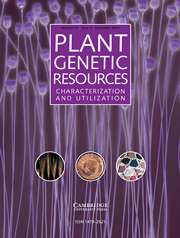Article contents
Soybean PI 675847 A as a new source of salt tolerance
Published online by Cambridge University Press: 25 September 2018
Abstract
Soil salinity is a major limitation to legume production in many areas of the world. Identification of the genetic source of salt tolerance is critical in soybean breeding for improving soybean production in salt-affected regions. Vietnam has unique sources of soybean germplasm and varieties are grown in the area where exposure to salinity is frequent. However, there is little research on the identification of salt tolerant sources in the Vietnamese gene pool. The present study compared 18 Vietnamese soybean cultivars for their differences in salt tolerance. Under a range of NaCl stress from 0 to 200 mM NaCl, there was a large variation in salt tolerance among the 18 soybean lines evaluated. The soybean accession PI 675847 A (Vietnamese variety DT2008), was identified as a useful source of salt tolerance. During vegetative growth, PI 675847 A had lower leaf scorch scores, higher cell membrane stability, better photosynthesis and biomass accumulation under NaCl stress than the other 17 strains evaluated. In addition, PI 675847 A maintained better growth and seed yield in salt-affected soils compared with the sensitive lines. Analyses of ion contents in plant leaves under saline conditions showed that PI 675847 A was able to limit uptake and transport of Na+ and Cl−. Because of its higher productivity under saline conditions, PI 675847 A will be a useful germplasm source in soybean improvement programs for salt tolerance.
- Type
- Research Article
- Information
- Copyright
- Copyright © NIAB 2018
References
- 4
- Cited by


